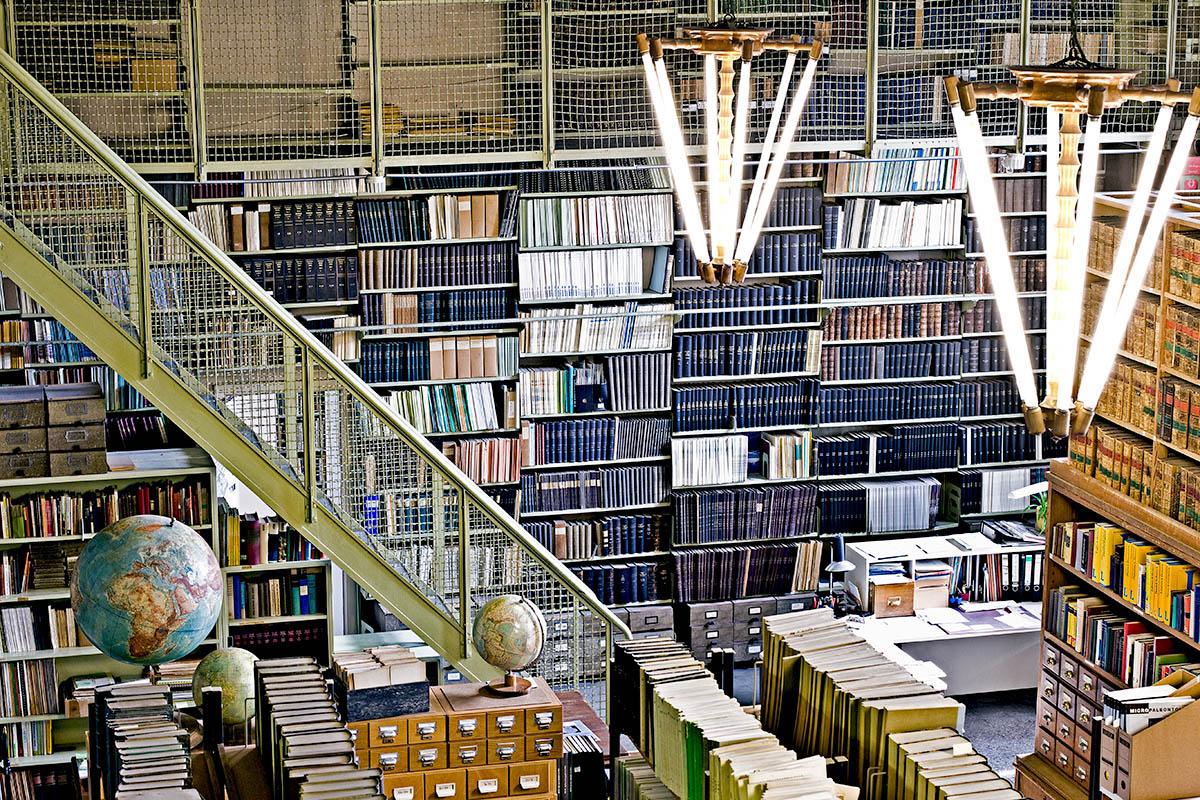Library catalog
The library holdings are listed online in the library catalog in full from 1963 onwards and in part up to 1962. It is supplemented by an alphabetical card catalog. It is supplemented by an alphabetical card catalog. In addition, the holdings are listed in regional and international catalogs, e.g. KOBV, KVK, WorldCat.
The library at the Museum für Naturkunde provides access to printed and electronic information in the fields of zoology, palaeontology, mineralogy, geology, the Anthropocene, natural history and history of science. As an important scientific information infrastructure and service facility, it supports scientists throughout the entire research process.
Its core competencies lie in the procurement and supply of information as well as the administration of paper-based information and digital licenses. Other areas of responsibility include the maintenance and digital indexing of the valuable collection, which serves both to provide information and as collection objects has its own historical and scientific-historical value.
The library holdings comprise around 386,000 items, including 2,650 maps, more than 700 printed journals and access to 14,514 electronic journals (as of 2022), which are distributed across various rooms in the museum and external locations. The reference library is primarily available to museum employees, but also to interested specialists and the public.
You can find the library regulations here
Academic publishing and Open Access
Part of the library is the Academic Publishing Coordination Office, which provides advice and publication services relating to academic publishing.
It provides advice on publication management, open access and initial information on the legal aspects of publishing. The Coordination Office is also developing internal training courses and is focusing on innovative approaches and methods, which were recognized with the short-list nomination in the “Skills Transfer” category for the Enter Award 2024.
The Coordination Office is responsible for strengthening open access at the museum and develops, updates and publishes the Open Access Policy. With the Deutsche Entomologische Zeitschrift, Fossil Record and Zoosystematics and Evolution, the museum also offers three original open access publication platforms that cover a wide range of topics in the field of natural science.
Collection cataloging and development
The library is involved in the relocation-related cataloging and development of the collection as part of the future plan. As part of this, the library has moved into an interim external location where the historical holdings are also being digitized. The digital copies are published in the Biodiversity Heritage Library. In addition, the historical holdings are being retro-catalogued, i.e. written in an electronic catalog. The library catalog and the library management system have been converted to an open source solution.
Digitized historical holdings Biodiversity Heritage Library
Digitized historical holdings on the edoc server of the Humboldt-Universität zu Berlin
Digital catalogs and databases
We recommend the following selection of catalogs and databases for natural history research and information retrieval. For further resources, please contact the library team by e-mail.
- Library catalog: The library holdings are listed online in the library catalog in full from 1963 onwards and in part up to 1962. It is supplemented by an alphabetical card catalog.
- Elektronische Zeitschriftenbibliothek (EZB): Overview of electronic journals. Access partly only possible via The Museum Network.
- Zeitschriftendatenbank (ZDB): Magazines and series in libraries in Germany
- Kooperativer Bibliotheksverbund Berlin-Brandenburg (KOBV): The most important Berlin-Brandenburg catalogs
- Karlsruher Virtueller Katalog (KVK): Selection of all German union catalogs and international catalogs
- Biodiversity Heritage Library: Digital library on current and historical biodiversity literature
- JSTOR Museum Collection – Access partly only from the museum network
- Web of Science mit Science Citation Index (mit Archiven ab 1995, inklusive Zoological Record ab 1864) und Journal citation reports – Access partly only from the museum network
History of the libraries
These libraries were founded at the same time as the university in 1810. The Zoological Library is still one of the most important reference libraries for zoology in the German-speaking world, with holdings dating back to the 15th century. Some of the bibliophile treasures come from the library of the Gesellschaft Naturforschender Freunde zu Berlin, founded in 1773, whose members included such important natural scientists as Rudolf Virchow, Adalbert von Chamisso, Robert Bunsen, Alfred Brehm, Georges Cuvier, Ernst Haeckel, Jean Baptiste de Lamarck and Alexander von Humboldt, to name but a few. Many of the volumes are personalized unique specimens due to the personal inscriptions of the scientists, which make this library so special.
Several special collections are of particular importance as historical book collections, e.g. the beekeeping library of the owner of the Berlin Gasanstalten and enthusiastic beekeeper Edward Drory (1844-1904), which contains around 2,400 volumes of literature from the 16th to 19th centuries, or the historical map collection of the important geologist Leopold von Buch.
